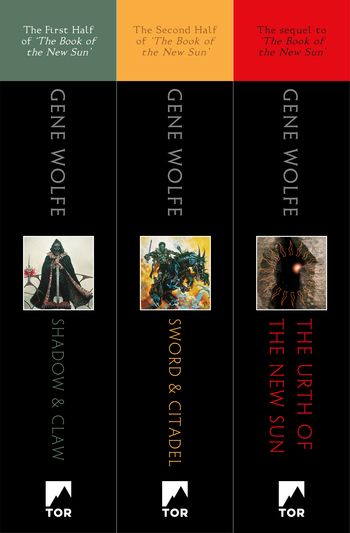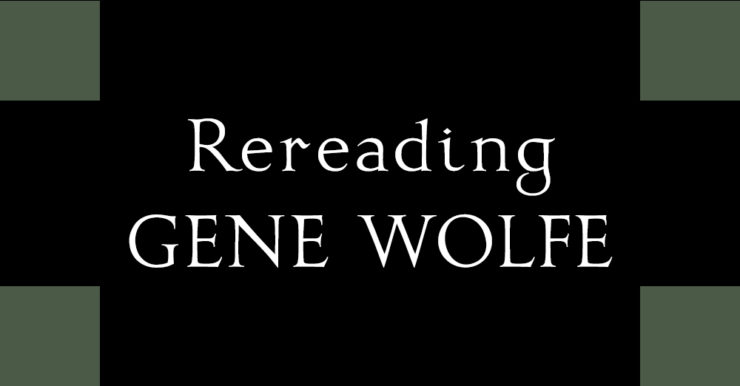How did I initially encounter Gene Wolfe’s work? When was the first time I heard his name?
I can’t remember exactly. Memory fails. It’s like a mist shrouding my eyes. It doesn’t help that I lost my only pair of glasses a few months ago and couldn’t afford a new one until last week, so this mist is not just a metaphor. The tribute to this Grand Master is quite fitting, I’m afraid.
But, if I could venture a guess, how then?
As far as I can remember (and I have a very selective memory), I have two possible explanations, maybe two origin myths for my meeting with this remarkable man. The first is fairly trivial: I might have read his name for the first time in Locus magazine, in the late eighties. But (speak, memory! — no, this is from another writer) I’m sure that I only started to subscribe to Locus years later, almost halfway through the nineties, even though I was well aware of the magazine’s existence at least since 1987, when I joined the CLFC (Science Fiction Reader’s Club) in Brazil.
The other possible version is that a friend of mine, Pedro Ribeiro (whom I had met also in 1987, but in a translator’s course) might have been the first person to tell me of Gene Wolfe. I like this version better, because it also carries the weight of discovery via the borrowing of a book. The book I remember very well: it was The Shadow of the Torturer.
Even though I wasn’t a Fantasy buff (but things have changed since then), Pedro told me: “I know you’re not quite into Fantasy, but I strongly suspect you’ll like this series.” Then he told me about The Book of the New Sun, and he spoke the key words to this science fiction reader: “far future.” I was by then already an avid reader of Jack Vance, and I loved not only his Demon Prince stories, but I also liked his Dying Earth saga quite a lot. So, Pedro added that the New Sun series (of which a new volume had just been published, being the ‘fifth’ book in the tetralogy) was set in the distant future, and I was already a sucker for this trope.
Then he let me borrow the first volume. And I loved it.
After that, of course, I took home all the other volumes with me. Details are fuzzy (as they tend to be in time, unless you have a perfect memory—as Severian, the protagonist, and I don’t), but what I do remember is the feeling of enjoyment, the sense of wonder recaptured between the pages of those five books. I was twenty-one and already was elbow-deep in ennui because I didn’t feel science fiction could surprise me anymore. I had devoured many of the classics, from Wells and Verne to Asimov, Clarke, Heinlein, Pohl. Also Kornbluth, Brown, Sheckley. I couldn’t quite wrap my head around the New Wave authors (I would, years later, but that is another story), and the cyberpunks were still a couple of years in my future. Octavia Butler and Ursula K. LeGuin were also waiting for me down the line, and I would soon come to feel more than a bit ashamed for thinking I knew everything.
Buy the Book


The Complete Book of the New Sun
I seem to be steering off course, but bear with me: Guilt is one of the things the careful reader should be watchful for in Wolfe’s oeuvre, especially that of the Roman Catholic variety. As a former Catholic myself (I had walked away from the church on my sixteenth birthday), having been a devotee of Saint Francis, I felt a kind of romantic kinship with Wolfe’s own personal Christ figure, Severian, a torturer’s apprentice who would face a hero’s journey of sorts to become the ruler supreme of his future Earth, the Autarch—but would pay for that at least two prices: one, mutilation. The other, remembrance. I will have more to say on that later. The details are fuzzy but the mist is clearing.
After The Book of the New Sun, Pedro lent me a standalone novel, There Are Doors, which was much lighter in scope and in number of pages, but eerily seductive. The plight of a simple man, a man with no interesting history to speak of (being therefore an unmemorable man) who sets out to find his lover, who is a goddess from an alternate timeline, intrigued me greatly. Memory and its byproducts—loss and nostalgia, among others—is also one of the pillars of Gene Wolfe’s fiction.
After that novel, I borrowed still another book, this time a collection of stories, The Island of Doctor Death and Other Stories and Other Stories. Soon after, I found in a used book store one of Wolfe’s other collections, Endangered Species —which contains some of my best-loved stories, like A Cabin on the Coast and The Detective of Dreams. Stories that also dealt with the pain of loss, and the hope of a better world—in dreams or in other realities.
Gene Wolfe became one of my favorite all-time writers. Not one of my favorite genre writers. One of my favorite writers, period. A full rereading of his works has been long overdue, but there never seemed to be a proper time for such an undertaking. When he passed away in April, I finally started preparing for this task. I made a list of his books. I had many of them but not all. I bought some and borrowed a few. Then I realized that, even having enshrined him in my personal pantheon for so long, I had read less than half of his books. Even though I loved The Book of the New Sun, and bought the entire Book of the Long Sun when I lived in London in the early nineties—and now I just checked the publication dates and discover that I’m lying to you and to myself, because the series wasn’t complete until 1996, so I certainly acquired the books *after* my European spree—I never got around to reading this part of the mega-saga. Much less the Book of the Short Sun, which I also purchased long ago… It doesn’t matter. They will be read now, and I will write about them here.
So, this Gene Wolfe Reread will also be a first-time read for me in some cases. I’m going to be reading Wolfe’s works in chronological order of publication, beginning with The Fifth Head of Cerberus, published in 1972. I decided not to review his first novel, Operation Ares, because it’s an early work and Wolfe himself didn’t like it. On the other hand, I’ll also write about related texts, such as the tribute volume Shadows of the New Sun (which contains two short stories by Wolfe, plus an interview) and the companion volumes Lexicon Urthus and The Wizard Knight Companion, by Michael Andre-Driussi, though not necessarily in separate articles. Every other Thursday, I’ll be publishing reviews and analysis of many of his standalone novels, including but not limited to Peace, Free Live Free, Pirate Freedom, Home Fires, The Land Across, A Borrowed Man, plus the entire Sun series, the Soldier series, and collections, such as Storeys from the Old Hotel, Starwater Strains and Innocents Aboard.
In doing so, it is my hope to recapture for myself some of that sense of wonder that only Gene Wolfe made me feel in my youth. This I remember well. And I hope you feel the same.
See you all on Thursday, June 27th for a discussion of The Fifth Head of Cerberus…
Fabio Fernandes started writing in English experimentally in the ‘90s, but only began to publish in this language in 2008, reviewing magazines and books for The Fix, edited by the late lamentedEugie Foster. He’s also written articles and reviews for a number of sites and magazines, including Fantasy Book Critic, Tor.com, The World SF Blog, Strange Horizons, and SF Signal. He’s published short stories in Everyday Weirdness, Kaleidotrope, Perihelion, and the anthologies Steampunk II, The Apex Book of World SF: Vol. 2, Stories for Chip, and POC Destroy Science Fiction. In 2013, Fernandes co-edited with Djibrilal-Ayad the postcolonial original anthology We See a Different Frontier. He’s translated several science fiction and fantasy books from English to Brazilian Portuguese, such as Foundation, 2001, Neuromancer, and Ancillary Justice. In 2018, he translated to English the Brazilian anthology Solarpunk (ed. by Gerson Lodi-Ribeiro) for World Weaver Press. Fabio Fernandes is a graduate of Clarion West, class of 2013.










